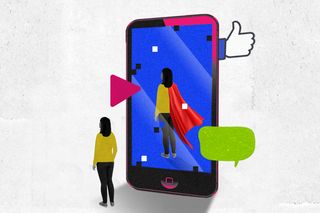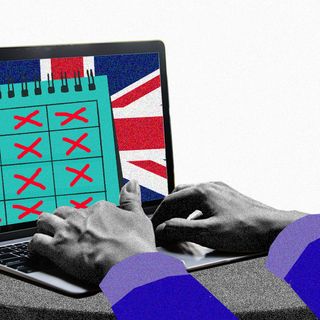
How Internet Culture Changed What It Means to be the ‘Best Version’ of Yourself
We are now more obsessed with the end result of “perfection,” rather than the insightful process of self-betterment.

The modern-day self-help book doesn’t come as a 356-pages hardcopy — it’s everything onlineand is written by everyone. There are informational posts on how to fix the physical and emotional; reels and TikTok videos churn out 10-pointer wisdom against zany music. “How to fix your life in 59 seconds” is a story about fixing your sleep cycle, doing the morning workout, the healthy granola-infused meal, setting emotional boundaries in relationships, reading, and neatly wrapping the day for another round of hustling. The end goal, the only goal, perhaps, is to be the best you. And here are people, eagerly living the life that one wants, actually making things happen — at least from a distance.
Yet, there’s something amiss in how this pursuit of the best has played out on the internet. This is a culture where one insists everyone curates a reality of being “authentic” and “natural” while looking perfect and polished all the same. At the same time, the internet — particularly social media — demands everything be documented and stored in some corner for it to be real. In the process, we unwittingly and unknowingly became more obsessed with the end result of perfection, rather than the insightful and promising process of self-betterment.
At one level, the template of personal enrichment has become a veritable aesthetic. One which counters the mayhem of emotional turmoil with traditionally beautiful, mollifying visuals. There’s nothing wrong with wanting to be “better” in theory; it is an abstract idea that quite literally means different things to different people.
But the internet is the only place where magic solutions exist. The process of self-betterment isthen increasingly accessible, quicker, and neat — as if following a template of mastery. Social media further aestheticized this journey by showering feeds with workout videos and self-care routines. Itmade the possibility of “epiphanies” and “self-betterment” into a templatized necessity everyone must work towards.
What feels awry is the artificial construction of all of it. Self-betterment came with epiphanies, perhaps epiphanies found while eating, praying, and loving. This is to say that epiphanies and actions were scattered, pushing people to do what they could when they could. The thing about self-betterment is it demands the work more than the result; the very act of working towards something is meant to be instructive. But when you package everything into an aesthetic and a vibe, self-betterment ended up carrying the unbearable expectation of templatized perfection — leading to more anxious, less fulfilled selves in the process.
Related on The Swaddle:
Why the Cult of ‘Doing What You Love’ is Losing Steam
The internet also works in extremes and illusions. This is the myth of the good life: one with cookie-cutter Kardashians and Kapoors living in beautiful apartments, practicing yoga, being happy. These are easy epiphanies and studies on how to be content; an unfailing trajectory that forces people to do X, Y, and Z things to be better. But we know the reality online creates a standard unattainable, upholding perfectionism as the grand standard of functioning. Research has well documented how posts, likes, and comments give way to feelings of perfectionism, anxiety, and even body negativity. The problem with being the perfect you is precisely this: this version does not exist and probably never will.
The tide of the internet and social media are linked to people setting irrational standards and subjecting themselves to harsh self-criticism, feelings linked to poor mental health. The slope of betterment is not upward and is not linear. If the internet and the people who participate in this exchange strive for a standard that is unattainable, they are set up for failure. Self-betterment by its nature has to have room for accepting flaws and faltering, this is a topsy-turvy curve — unlike what we see and hear from people’s narratives.
Moreover, the message seems to be you can’t be perfect unless this perfection is shared with everyone and adequately documented on the internet. What you do online matters more, so conforming to established aesthetics of perfection is an easier route. The insight of betterment — often fluid, imperfect, chaotic — suffers.
These are polemics and pep talks fashioned into posts and stories and reels and 280-character tweets — wisdom is everywhere. This creates an ideological chain: if the knowledge to be perfect is everywhere, and if it’s so accessible, it is on the person to access it and make sense of it and achieve those results. The inability to access, or engage with this content, presents a form of guilt that makes it harder to reconcile with ourselves. Contrast this with the perfect lives everyone else appears to live on the internet, and the loathing can be debilitating. One research looked at how perfectionism impacts young people on the internet. “People higher in self-critical perfectionism are therefore thought to be especially vulnerable to negative social comparisons. This is because they derive their self-worth from being seen by others as flawless,” the researchers concluded.
The internet is carefully contrived, with a sheen of excellence, further presenting perfectionism on a platter. But the thing about life lessons is: they are meant to be discovered and found, never given away in a template. “Send an email with a typo, take the extra time to sleep instead of study, or make a decision without agonizing over which options will get you closer to feeling near perfect. Finding those moments helps to reclaim balance,” said Jeremy Tyler,an assistant professor of clinical psychiatry.
Perhaps, this is where the undoing of all the listicles and reels trying to help people be the best version of themselves lies. These are “content” masqueradingas priceless, profound bits of digestible wisdom that hold the potential to revolutionize life. It is anything but so; it’s the mistakes and detours and digressions, tailored lovingly to the self, that leave the field aplenty for realizations, big and small.
Saumya Kalia is an Associate Editor at The Swaddle. Her journalism and writing explore issues of social justice, digital sub-cultures, media ecosystem, literature, and memory as they cut across socio-cultural periods. You can reach her at @Saumya_Kalia.
Related


Why Influencers Promoting ‘Hustle Culture’ to Young Followers Is a Dangerous Trend
